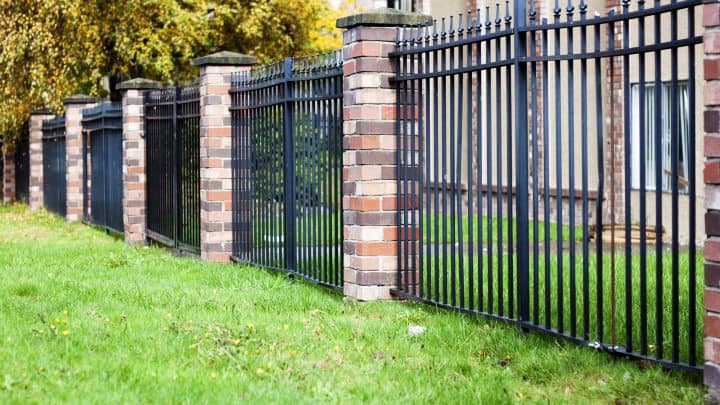Adding a fence to your property has a lot of benefits, including privacy and making your home look better in general — but it will also cost you money in labor and material costs. Will adding a fence also cost you when it comes to your property taxes?
Adding a fence will increase your property taxes, assuming the PVA reassesses your property. Property taxes are based on the current market value of your home. Because adding a fence will raise your market value, your property taxes will also increase.
This article explains the reasons why adding a fence increases your property taxes and the pros and cons of adding a fence. I will also explain a few ways to lower your property taxes to offset the increase from adding a fence.
Reasons a Fence Increases Property Taxes
Adding a fence to your property will increase property taxes, but it is important to understand why. Your property taxes are based on two different numbers: your home’s current value and the property tax rate set by your local government.
First, let’s consider the tax rate set by your local government. Each government has its own property tax that they charge every year. Sometimes it can stay the same year-over-year, or it can change annually. Some laws set by the states determine how much and how frequently the property tax rate can change and increase.
Even if you do not add a fence to your home, your property taxes can increase from year to year if the property tax rate increases. Additionally, if the rate stays the same from year to year, you might end up paying more in property taxes if your home’s current value increases, such as from the addition of a fence (we actually wrote about whether or not it’s likely to increase the value of your home here).
Every year somebody from the government will assess your home and determine its current property value. The latest value determined by this assessor is how your property taxes are determined.
The person assessing your home may come to your property and look at the home itself, either just externally or internally, too, if you allow them inside. Alternatively, they may just use remote software to estimate the current market value of your home.
The assessor will also compare your home to other homes around it and similar homes in your neighborhood to determine the market value. No matter how they determine the value, adding a fence increases the value of your home.
Once the market value of your home is determined, the value is multiplied by the current property tax rate, and that is how much you must pay in annual property taxes.
Other Pros and Cons of Adding a Fence
Other than the fact that it raises your property taxes, there are many pros and cons of adding a fence to your property. This section explains some of the factors that you need to consider if you want to add a fence to your home.
Pros of Adding a Fence
There are many benefits of adding a fence to your property.
Wide Variety of Options: There are many different styles of fences available for your home, available in many different price ranges. If you are looking for a low-cost fence, chain link fences are among the most affordable options. Wood fences are mid-range in price and wildly popular, while vinyl fences are higher-cost but have fantastic curb appeal and are extremely low maintenance.
Privacy: If you feel exposed to your neighbors when you are out in your yard, you can put up a fence to give yourself some privacy. Installing a fence will also help with defining property lines.
Increased Home Value: Adding a fence to your home can increase the marketability of your home. If you have plans to sell your home in the future, installing a fence on your property can be a good investment.
Safety: A fence can provide a safe place for pet animals and small children to play without the danger of wandering off somewhere they shouldn’t be. It also adds a level of security by blocking access to some exterior doors.
Cons of Adding a Fence
Cost of Materials: Adding a fence to your home costs you money, and it is more than just higher property taxes that you will have to pay. You will need to purchase all of the required materials and, depending on what type of fence you are installing, that can be a hefty bill.
Cost of Labor: When you add a fence to your home, you either have to hire somebody to install it for you or spend a lot of time installing it on your own. Labor costs money in addition to the materials you will need to purchase.
Securing a Permit: You will need to make sure you are meeting any city ordinances before installing your fence. This means applying and paying for the proper permits.
Maintenance: You also need to consider the maintenance cost of keeping your fence looking good after you install it. Cheaper fences require more upkeep. Chain link fences can bend and come apart over time, and wood fences may rot if you do not clean and stain them properly.
Ways To Lower Your Property Tax Bill
There are some ways that you can lower your property tax bill, which can offset the increase in property taxes from your fence.
First, if you feel that your current market value assessment is too high, you can ask for a copy of the assessment and review it to ensure that nothing is wrong or was overestimated.
Reviewing your assessment is especially important if the person who assessed your market value did not have a chance to look at your home, and your assessment was based on the value of homes in your neighborhood.
If you find any mistakes or discrepancies in your market value assessment, you can have the government reassess your home or fix any mistakes before charging you property taxes.
Another way to keep your property taxes low is to not make any major changes, including adding a fence until after your home has been assessed.
Although changes like a fence will still increase your property taxes for the next year, you can keep your current year’s taxes low by not making any major changes until after the home has been assessed. That way, you can still add your fence without having to immediately pay higher property taxes.
You can also see if you qualify for any tax exemptions on your property taxes. The tax exemptions will vary by city and state, but the most common exemptions are offered for seniors, veterans, people with disabilities, and even some agricultural properties.
If you want to find out if you are eligible for any tax exemptions, you can contact your government or use many other resources. For example, Military Benefits has a list of property tax exemptions offered to veterans in each state.
Final Thoughts
Because property taxes are based on your home’s current market value, it is likely that installing a fence will, in turn, also increase your property taxes.
You can keep your property taxes on the lower side by being strategic. Plan out when you will install your fence, take advantage of any tax exemptions available to you and always be sure that your market value assessment is accurate.

